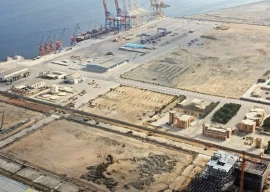
Pakistan and the International Monetary Fund (IMF) will begin talks today (Friday) for the next $960 million loan tranche and have set the first session for discussion on the new budget and impact of deviation from prudent economic policies.
The new IMF mission chief and his team will join the talks virtually from Washington.
The seventh round of review talks from March 3 to 11 is taking place days after the government abandoned the implementation of sound economic policies in pursuit of populist political agenda.
The government of Prime Minister Imran Khan agreed with the IMF to implement a prudent macroeconomic framework in January this year in return for the revival of stalled loan programme.
The government and the central bank have implemented most of the IMF conditions regarding monetary and fiscal targets agreed for end-December 2021. But they are in serious violation of the condition of “not to grant further tax amnesties” and not to intervene in the exchange rate market.
Read: Implications of the resumed IMF deal
If both sides manage to complete review talks by March 11 and also converge on the new relief package, the IMF board may take up Pakistan’s request for approval of over $960 million in loan tranche before the end of next month.
Approved in July 2019, the IMF has so far disbursed $3 billion out of the $6 billion package, as the programme has remained derailed for almost half of the period.
Just one month after its approval, it got another setback when Prime Minister Imran Khan announced a Rs240 billion relief package without caring for its implications for the review talks.
The PM’s statement that the Federal Board of Revenue (FBR) collected enough taxes to finance the package does not fully reflect the ground realities, as the FBR has not yet officially revised upwards its monthly targets despite a Rs272 billion increase in its annual target.
“The authorities and the IMF will discuss recent developments, the merits of the recently adopted relief and industrial promotion packages, and other measures to promote macroeconomic stability, during the upcoming mission,” said Ashter Perez, IMF Resident Representative, while responding to a question.
The IMF and Pakistan would discuss broader contours of fiscal year 2022-23 budget and the debt situation on Friday.
Finance Minister Shaukat Tarin is expected to hold first round of talks with the IMF on Tuesday (March 8) after his return from an ongoing trip to Turkey and the United Arab Emirates (UAE).
The IMF saw the completion of sixth review of the programme as a major step towards normalisation of policies for addressing external and fiscal sector imbalances.
But in no time the government compromised the principle of sound economic policies and automatic change in electricity tariffs by pausing the increase in monthly fuel price adjustments and giving a tax amnesty scheme to the billionaires.
Pakistan is also in violation of the commitment to implement the market-based exchange rate and has been intervening in the market, according to the sources.
The central bank has digressed from its commitment at a time when the current account deficit, on average, is increasing by $2 billion a month for the past few months.
The flexible market-based exchange rate is part of the four core objectives of the $6 billion programme.
SBP Governor Dr Reza Baqir has recently said that the monthly current account deficit of over $700 million should be seen as problematic.
Sources said that the IMF would also discuss monetary and exchange rate policies and their effectiveness in containing the current account deficit.
The Fund will also assess the loans being disbursed by bilateral and multilateral creditors including rollovers by China.
Sources said that the government might not face any difficulty on account of meeting the net international reserves (NIR) target.
The IMF had relaxed the NIR target in the last review against the actual net reserves witnessed by the end of September 2021. The central bank was also within its target to limit the foreign currency swap position to $4.9 billion.
The federal government has met the primary deficit target for the end-December period and the FBR’s tax collection is also in line with the IMF condition.
However, the conditions of cumulative spending on health and education and reduction in circular debt were not fully met, said the sources.
Tarin may find it difficult to convince the IMF about the need for giving another tax amnesty scheme to the billionaires by allowing them to legalise their black money at a cost of just 5%.
The government’s decision to allow income tax credits is also against the IMF’s policy to minimise tax policy loopholes.
Sources said that in its first formal interaction with the FBR by the middle of next week, the IMF would ask taxmen about the new tax amnesty scheme, followed by sessions on reduction in income tax slabs and the outcome of construction sector relief packages.
Published in The Express Tribune, March 4th, 2022.
Like Business on Facebook, follow @TribuneBiz on Twitter to stay informed and join in the conversation.






1719053250-0/BeFunky-collage-(5)1719053250-0-270x192.webp)














COMMENTS
Comments are moderated and generally will be posted if they are on-topic and not abusive.
For more information, please see our Comments FAQ